The apocalypse is nigh, and the world will never be the same.
Today, we bring you three books about the end of the world as we know it…and what happens in the aftermath.
(I feel like channeling Rod Serling today. Maybe because of all the Twilight Zone talk yesterday, or maybe because as I’m writing this review there’s a marathon of the show on SciFi right now – and yes, I spelled that “SciFi” because I refuse to spell it the new idiotic way)
Exodus by Julie Bertagna
Genre: Apocalypse, Dystopia, Science Fiction, Young Adult
Publisher: Pan Macmillan (UK) / Walker Books (US)
Publication Date: August 2002 (UK) / February 2009 (US)
Paperback: 368 pages
Rod Serling’s Summary:
Picture a future, call it the year 2100. This girl you see here is Miss Mara Bell, and that rock she stands on is what she thinks is the last island in a sea-covered world. We’re about to discover that the sea won’t stop rising, and Miss Mara Bell is about to embark on the journey of a lifetime across an ocean of dreams, hopes and nightmares. She is about to skirt the edges of a strange new world, one that we call The Twilight Zone.
Review:
In the year 2100, Mara bleakly emerges from her battered family home after weeks of being sheltered inside, during a rare break in the hot, torrential rains. Her world, the island of Wing, is a drowned relic of older times and she’s alarmed to see that the sea has risen several feet, claiming ever more precious land for its own in the while she has been shut in. Mara knows that she and everyone left on Wing must soon leave their small, drowning island and soon, and after speaking with the village elder, Tain, Mara has some hope for the future. Tain remembers the early days when the floods started to claim the planet, and he remembers watching the television and seeing the construction of new cities in the sky, safe forever from the rising sea levels. Before young Mara can lead her people across the vast unknown ocean, she needs proof that someone or something else is out there, and she uses her ancient cyberwizz to scan the remains of the Weave for any evidence of life. When she meets another person, the Cyberfox, in the electronic ruins and then discovers the virtual superstructure of one of those mythical cities, “New Mungo,” Mara finally has all the proof she needs – and just in time. The latest storm has pushed the water even further up Wing with an immense tsunami, and with no other solution, the villagers hastily prepare to abandon their small rock with nothing but hope and fear to guide them.
Mara’s ship reaches New Mungo (though the other two are missing), but what she finds there is far from comforting – the city, twin towers of flexible, indestructible metal swaying over the sea is surrounded by a thick wall. And outside that wall there are boats; countless boats full of emaciated, dying refugees. Also, there’s a welcoming party for Mara and her fellow villagers – a shiny police speeder fires warning shots and charges at Mara’s boat, exploding in the water near them. Mara despairs, for she has led people from death by drowning to a death by starvation, and she resolves to find a way into the city, and to save her people, or die in the process.
Exodus is a breathtaking novel for its scope alone – from the submerged ruins of what used to be Britain, Mara travels across towering waves to the tattered outskirts of a wondrous city, then to forgotten covered forest remains of Glasgow beneath the city, and finally into the futuristic city itself. In Ms. Bertagna’s world, Earth has succumbed to a death by way of global warming. The ice caps are melting at an exponential rate, and by Mara’s time what ice is left at the poles is leading to the rapid water rise and destruction of the little island they call home. This is a book about the strength of the human spirit in the face of certain death and despair, as Mara and her people leave all they have ever known for a dream of hope in another city – and then when they reach the city, they are turned away like so much floating rubbish. In the waterborne slums surrounding the protective wall of New Mungo, Mara’s world changes – from the quiet solitude and gradual despair of drowning on Wing, the villagers face a new challenge in the refugee camps: death by starvation or sickness, forced to eat poisoned fish from the toxic waters of the city’s waste. Those few who are strong and young enough are whisked away by “pickers” from the city, but for what purpose, Mara has no clue, and she instinctively does not trust them. When hope is lost and Mara makes a last desperate stab to get past the outer wall, she finds herself in another world altogether beneath the city itself, anchored to the remains of Glasgow. Treenesting people here face the same threats that Mara did on Wing – though they are safe for the moment, the storms and ever rising sea threatens to submerge their refuge below forever, so Mara undergoes another transformation as she sneaks into the city itself. From the desperate worlds she has known all her life, the city is completely alien to Mara – people embrace a high technology society, without a thought or care for the outside world, or for their collective past.
The shifts in location are dizzying, but brilliantly written. Never once did I feel like the story “got away” from Ms. Bertagna; rather, she handles the numerous shifts in locations, scope and idea with a skilled, tempered hand. In addition to being a book that traverses wide and far physically, thematically it also is quite grand in its conception. Fear of death is Mara’s initial worry, but it melts and changes to fear of living while others suffer, or living a lie as those in the city of New Mungo do. There’s a discussion of the extent humans will go to in order to protect themselves and survive, whether it be on the cruel harsh reality of the refugee ships outside the city, to the cool blissful life inside its walls – but it all comes down to the same human element, as Mara discovers through Ms. Bertagna’s sharp pen. There’s also a look at how prophecy or spirituality plays into the end of the world (as you might tell from the biblical title) – but rest assured this is not a “religious” book. Something I’ve noticed in dystopian/apocalyptic novels is the tendency to go all or nothing in terms of science or religion – but Exodus manages to weave both prophecy and science together in an entirely satisfying and impressive way.
So far as characters are concerned, the story is narrated in the rare third person present tense, with insights to Mara’s thoughts. Getting to know and understand Mara is easy as she is a believable, scared, and sympathetic teenager. She’s a bit of the usual reluctant hero character, but her fears and worries and her willingness to brave the odds in the face of impossibility makes up for any blandness. The secondary characters too are well constructed, with a shocking amount of subplots and character arcs. Even though Exodus is just over 350 pages, there’s an immense wealth of detail and character here. My favorites had to be the eldest treenester Candleriggs and her heartbreaking story, and the orphan “water rat” Wing, named for Mara’s home. Even the characters we meet for just a few scant pages felt completely real, and this is testament to the strength of Ms. Bertagna’s writing. It’s truly impressive stuff.
So, in short, I loved this book. Moving on a number of levels, filled with action and with carefully constructed characters and a stunning breadth of plot, Exodus is easily one of my top notable mention reads of the year. And now I need to run out and get Zenith. Immediately.
Rating: 8 Excellent
Genesis by Bernard Beckitt
Publisher: Longacre Press (New Zealand) / Houghton Mifflin Hartcourt (US)
Publication Date: August 2006 (New Zealand)
Hardcover: 160 pages (US)
Rod Serling’s Summary:
This is Anaximander, a dreamer, a historian, and the Academy’s latest applicant. Beyond these doors, Anaximander thinks she’s about to face the most grueling exam imaginable, in the culmination of her young life. She’s wrong. For beyond these doors is the thinly veiled dimension between the known and the unknown, the space between human and machine. Anaximander is about to enter the insubstantial world of The Twilight Zone.
Review:
It is centuries into the future, and the world has been ravaged by war, climate change, and a bioengineered weaponized plague. One enterprising man named Plato saw the decline coming and built his Republic on a cluster of islands in the southern hemisphere, creating a wall around his newfound civilization and cutting off the outside world. Within Plato’s Republic, all people were safe from plague and the last great war, and remained happy for a long while. When the terror of plague and war faded from common memory, however, people like Adam Forde began to question their roles in this new Republic, and changed society forever.
Adam Forde’s extraordinary life and death is the subject of Anaximander’s specialty during her entrance examination before The Academy. She feels an inexplicable connection to Adam, drawn to his story from the time she was very young, and she knows the history surrounding his life inside and out. For four hours, Anax goes through the most trying experience of her intellectual life, with only one goal in mind: to impress the examiners, and to gain entry into the most prestigious, exclusive, and powerful group of the remaining world.
Genesis is unlike any book I’ve read this year – dystopian, young adult or adult. Its size is deceptive; at a slim 140 pages, I expected this to be a quick read. Genesis is an incredibly dense book, full of challenging ideas and philosophical ponderings – indeed, so challenging that I had to double check that it was written for a Young Adult target audience. Written almost entirely as a transcript of Anax’s examination (but with insight to Anax’s tumultuous emotions), the book is like a doctoral thesis, and in essence a giant data-dump. Examiners ask Anax to explain the political and social circumstances leading up to Adam Forde’s life in Plato’s First Republic, and Anax answers in a very history-text sort of manner. This is not to say that Genesis is a dry or undreadable book – in fact, it’s incredibly engaging. Anax’s inner thoughts and her persuasive and knowledgeable tone help create a genuine story from her world’s tragic history. Interestingly, the main characters of this book are not so much Anax or the memories of herself and her tutor Pericles, but rather the man she talks about during the course of her examination: the indomitable Adam Forde. And, of course, his constant cell-mate and philosophical debate partner, the first successfully created machine with artificial intelligence, wearing the ghastly face of an orangutan, named aptly “Art.”
Genesis is a provocative book, forcing readers to confront some tough questions. Like, for example, the latest incarnation of Battlestar Galactica, lines are tested, crossed and blurred into oblivion. What is it that makes someone human? What is it that makes one a machine? Adam and Art’s conversations are deeply thoughtful and present valid arguments for both man and artificial intelligence. Perhaps the most fascinating aspect, in my opinion, is Art’s take on the evolution of life:
“You people pride yourselves on creating the world of Ideas, but nothing could be further from the truth. The Idea enters the brain from the outside. It rearranges the furniture to make it more to its liking. It finds other Ideas already in residence and picks fights or forms alliances. The alliances build new structures, to defend themselves against intruders. And then, whenever the opportunity arises, the Idea sends out its shock troops in search of new brains to infect. The successful Idea travels from mind to mind, claiming new territory, mutating as it goes. It’s a jungle out there, Adam. Many Ideas are lost. Only the strongest survive.
“You take pride in your Ideas, as if they are products, but they are parasites. Why imagine evolution could only be applied to the physical? Evolution has no respect for the medium. Which came first: the mind, or the Idea of the mind? Have you never wondered that before? They arrived together. The mind is an Idea. That’s the lesson to be learned, but I fear it is beyond you. It is your weakness as a person to see yourself as the center. Let me give you the view from the outside.
“Are you still with me? I know you are. Thought, like any parasite, cannot exist without a compliant host. But how long would it be, did you think, before Thought found a way of designing a new host, one more to its own liking?
“Who built me, would you say? Who built the thinking machine? A machine capable fo spreading Thought with an efficiency that is truly staggering.
“I wasn’t built by humans. I was built by Ideas.” Art spoke with a new enthusiasm. His eyes widened, his lips flapped, drool spooled to the thick orange hair of his neckline. Adam recoiled, flinching as Art’s words hit home.
The Idea as a sentient being, ever changing, picking and infecting its hosts…it’s a staggering thought. And this is just a taste of the engrossing discussions Genesis provides.
I’m still not sure I’m quite smart enough to grasp and fully comprehend these renegade Ideas that flow from Genesis‘s pages and invade my mind, but I do comprehend that this is a rare gem of a novel. The allure of Genesis isn’t necessarily in its story (which is more like the Twilight Zone episodes I have jokingly used to introduce each book in this post), but in the Ideas that the story propagates.
It quite simply left me speechless. Another easy pick for one of the best books I’ve read in 2009. Highly recommended.
**Note: PLEASE refrain from reading summaries of this book from Amazon, which irresponsibly spoil the story. If you want a more clean cut synopsis, I recommend checking out the publisher’s website HERE.
Rating: 8 Excellent
Tomorrow, When the War Began by John Marsden
Publisher: Pan MacMillan (Australia) / Scholastic (US)
Publication Date: 1993 (Australia)
Paperback: 288 pages (US)
Rod Serling’s Summary:
On a hot day in a small Australian town, a group of teenagers emerges from a camping trip in the wild. The homes they return to are empty, their town seemingly deserted. But for Ellie and her friends, the battle has just begun.
The time is present day. The place, The Twilight Zone.
Review:
After a camping trip in the bush, Ellie and her five friends return to their small rural town to find their homes deserted, their animals dead, and not a soul in sight. Over the course of their happy, oblivious vacation in Hell (the ironic name given to their lush, lovely campsite), the group realizes that their country has been invaded by a foreign force, their homes ransacked, their families taken as prisoners. Isolated, the teens have to come to a decision – whether to stay hidden in Hell with supplies and lay low until the invasion is ended one way or another, to surrender to the invading forces, or to fight back in any way they can.
Tomorrow, When The War Began is the first book in John Marsden’s beloved Tomorrow series (seven books strong, with a spinoff trilogy titled The Ellie Chronicles as well), and a novel I had read and loved as a young adult. For Young Adult month (and in part inspired by fellow blogger Rhiannon Hart‘s ‘Dystopia Challenge‘ in which she rereads a few old favorites as well as discovers some new books), I decided to give this first book a reread…and damned if I don’t want to rush out and reread the entire series. Heck, I can barely remember the later books, and I never read the Ellie Chronicles. Obsession alert, as Ana would say!
Rereading Tomorrow makes me remember why I fell in love with dystopian, apocalyptic novels in the first place – confronted with world-shattering changes, the people in these stories have to pull themselves together, or be lost in the rubble. Such are the characters in Tomorrow. Narrated completely by Ellie in the form of a written record (for posterity and to make sure their story is told), these seven teens are portrayed as terrified and confused, but also incredibly stepping up bravely to face the impossible situation they find themselves in. Ellie’s narration paints each character as invaluable in their own distinct ways – Robyn the spiritual, graceful and competitive thinker; Fi the scared, sheltered friend who somehow refuses to shut down even while she’s terrified; Corrie, Ellie’s quiet, observant best friend; Kevin the stubborn hothead who Ellie still recognizes as perfect for her best friend; Lee the clever, intellectual musician; and finally Homer, Ellie’s old friend, a former prankster who miraculously becomes the perfect mastermind for their small group. And, of course, there’s Ellie herself – as Ellie is writing the story, she doesn’t pass judgment on anyone and relates her own thoughts and feelings as honestly as she can – and we readers appreciate her as incredibly brave despite her own crippling fear, and instinctively very smart. I came to love all of these characters in their own different ways, especially Ellie for her sense of humor and open honesty in this written testimonial.
Besides the strength of the characters, Tomorrow is an intensely action-filled book. Sneak patrols, dodging foreign soldiers, shoot outs, explosions, covert attacks…you name it, it’s in here. There’s also a bit of teen romance (of the not disgustingly sappy variety, thank goodness), and an intriguing mystery/urban legend subplot with the old hermit who lived in Hell. Basically, there’s something for everyone – romantics, adrenaline junkies, apocalypse lovers, war readers – in this powerful novel.
I found myself loving this book even more upon rereading it than I did when I first read it as a twelve year old. The stakes seem higher now, the characters more relateable. The only niggling drawbacks I found with the book was how lucky these characters all were – true, they are tenacious and rely on their own smarts to get into and out of situations alive (and there are high costs for their heroism), but on the whole, these are some lucky teens. Of course, things get a little hairier as the series progresses, so I’ll have to reevaluate when I finish rereading the rest of the books in the series! Also, while Ellie does make sure to mention that there are arguments and irritations within the group, on the whole she is quite charitable with each friend…and under so much stress, things cannot stay so happy forever. Again, something I’ll have to reevaluate it upon my next reread.
One final note – this book, along with Isobelle Carmody’s Obernewtyn Chronicles and Nevil Shute’s On The Beach (to be reviewed later during our Young Adult Appreciation Month) were some of my very favorites as a young ‘un. And, each of these authors? They’re Australians. I maintain that Australians for some reason write the best apocalyptic fiction. Anyone want to prove me otherwise?
Bottom line: I loved this book even more as an older reader and absolutely recommend it to everyone. If you haven’t read the Tomorrow series yet, what are you waiting for? Get on it already!
Rating: 8 Excellent
Additional Thoughts: Want more (Post-)Apocalyptic and Dystopian Young Adult Novels? Stick around, as later this month we’ll continue the love with more reviews and recommendations. Here’s a taste of what’s to come:
Reading Next: Dull Boy by Sarah Cross

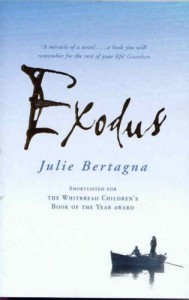
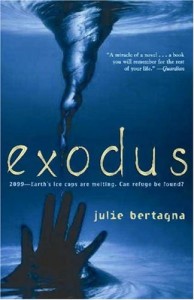

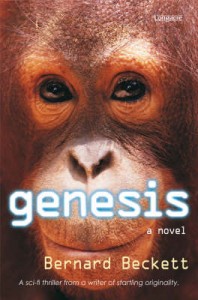
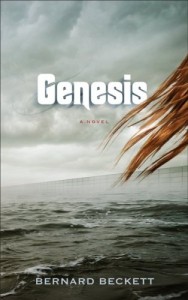
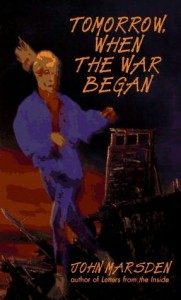
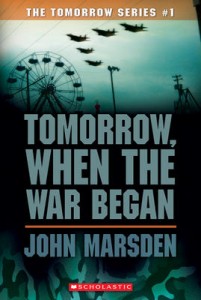
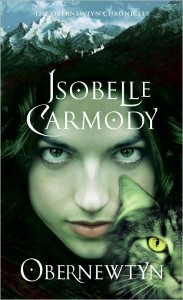
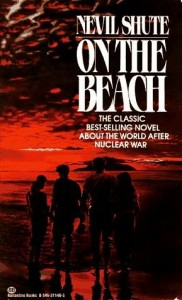

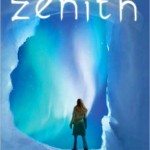
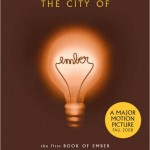
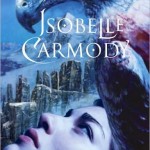
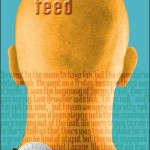
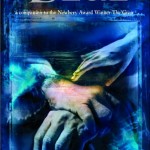
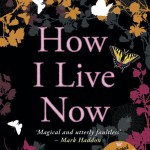
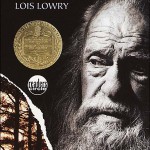
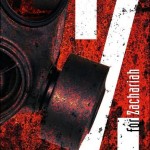










18 Comments
Celia
August 7, 2009 at 1:34 amGreat reviews! I too loved Isobelle Carmody…
Karen
August 7, 2009 at 1:44 amGreat reviews. I’ve read Genesis and have Exodus on my tbr already and will be adding Tomorrow to it.
I found Genesis a very intriguing book though I think a lot of it went over my head!
Rhiannon Hart
August 7, 2009 at 2:12 amThanks for the shout-out, Thea! I’m looking forward to re-reading Tommorrow later in my challenge, I just loved it as a teen. And I can’t wait to see what you think of Obernewtyn (gush, praise) and On the Beach. Us Aussies, at the arse-end of the western world, do have a gloomy knack of wondering what it would be like if we were suddenly cut off from everything. Island nation and all. Viva la Dytopia Day!
Rhiannon Hart
August 7, 2009 at 2:25 amIn regards to Exodus, I have noticed that there’s a dearth of contemporary YA climate change dystopias out there. Why is that–too close to home? People during the Cold War could cope with nuclear apocalypses, so why not us with climate change apocalypses in the age of global warming? The Carbon Diaries 2015 was pretty unsatisfying. I’ll have to give Exodus a go.
The Book Smugglers » Blog Archive » Young Adult Appreciation Month … - Obernewtyn Isobelle Carmody books - Obernewtyn
August 7, 2009 at 2:59 am[…] See the original post here: The Book Smugglers » Blog Archive » Young Adult Appreciation Month … […]
Diana Peterfreund
August 7, 2009 at 4:25 amRhiannon. Aside from the several mentioned here, you can also try THE OTHER SIDE OF THE ISLAND, FLOODLAND, FEED, LIFE AS WE KNEW IT, and THE SKY INSIDE, for books that deal with apocalypse through (or partially through) climate change. (Granted, LIFE… is not about human-caused climate change, but still).
Honestly, I don’t think there’s a dearth. It’s one of my favorites, too.
Jamie
August 7, 2009 at 5:08 amI LOVE dystopian day!!! This is awesome. Dystopian novels have always been something I’d stumble across and fall in love with, but you guys are laying them out there with titles, authors and suggestions for others. It’s great. Thanks Smugglers!
sharonluvscats
August 7, 2009 at 9:57 amOh I <3 this post. I'm such a huge dystopian novel geek. I've had both Exodus and Zenith sitting in my tbr pile for some time. Your review makes me want to start reading them right now.
This is the first that I've heard of Obernewtyn Chronicles. I will have to check them out especially since there is a cat on the cover!
Thea
August 7, 2009 at 10:20 amCelia – Thanks! Isobelle Carmody is just fantastic. I am so stoked that Random House rereleased the entire series for a new generation to discover and love 🙂
Karen – Genesis was pretty intense, wasn’t it? I understand your feelings – I still am grappling with some of the debate and philosophical pondering in that book! I hope you enjoy Exodus and Tomorrow.
Rhianon – My pleasure! Obernewtyn has long been one of my favorites, and strangely enough I had to read On the Beach in middle school and it has really stayed with me all these years! You Aussies and your awesome apocalypse (and fantasy) stories 😉
As for Climate-Change dystopias, I think it’s a sub-genre that is really gaining ground now, as Diana says. Exodus is the second flood-catastrophe book I’ve read this year (Flood by Stephen Baxter being the other – though that is an adult SF novel), and just the other day I saw this one coming out soon as well: Island at the End of the World by Sam Taylor.
I think the prevalence of nuclear holocaust/apocalypse books overshadows the climate change variety, but in time I’m sure we’ll see more emerge. I haven’t read The Carbon Diaries 2015, but maybe I’ll hold off on that if it wasn’t that great. I hope you do get a chance to read (and hopefully enjoy) Exodus!
Diana – More book suggestions! My poor, poor wallet. Hehe. No seriously, of the books you mention I’ve only read Life as We Knew It (my favorite book of last year), and I have Feed to read as well. I’ll definitely have to check the others out. Thank you!
Jamie – My pleasure! I’m so glad the recommendations are helpful for you, and I hope you enjoy some of these fab titles 🙂
Bart's Bookshelf
August 7, 2009 at 11:40 amI’m very lucky to have had an Aussie as on online friend for a number of years (although given the cricket today, I might have to reassess that, when I log in to MSN Messenger…) who recommended the Tomorrow Series to me last year, and I have to just agree with how fantastic it is, I devoured the entire series (inc The Ellie Chronicles) just as quickly as I could get hold of the books.
If one arrived in the middle of another book, that book was immediately forgotten about 😀
Brilliant, brilliant series.
(and I remember loving On The Beech as a teenager as well, but I am a ‘Pom’ so I’m genetically unable to claim Aussies are the best at anything, however good they may be! :wink:)
KMont
August 7, 2009 at 12:44 pmWow, this is a lot to absorb. The last book reviewed, Tomorrow, When the War Began, sounds pretty promising. Actually they all sound good. If I had to pick just one, right now, I don’t think I could. Must look into these some more – sans those frustrating Amazon summaries.
Dan
August 8, 2009 at 5:44 amGreat reviews, I’ve got to add these to the look for lists, especially Genesis. You do a great reincarnation of Rod, by the way. Thanks.
News from the Post-Apocalypse | Senor Parrot's Perch
August 8, 2009 at 5:55 pm[…] of the start of the end of time. What will the world look like then? The Book Smugglers has a fantastic review of several books dealing with the post-apocalypse. Wars aren’t the only cause of the apocalypse, these days, we also have environmental […]
Rhiannon Hart
August 8, 2009 at 9:18 pmThanks for those climate apocalypse recommendations, Diana. I did read Life As We Knew It a month or so ago because the Smugglers recommend it, and while it’s not strictly climate change as we’re expecting it to be, it’s definitely a great climate-kills story. I’ll look for the others you mentioned.
Hehe, I’m so basking this Aussie fiction love-in.
And P.S. Diana, I can’t wait for the release of your book over here!
Kay
August 9, 2009 at 9:03 amThank you for such a great post! I love post-apocalyptic/dystopian novels and am always looking for new suggestions. I read Obernewtyn recently and really enjoyed the universe, so there’s a big chance I’ll read the next one. Genesis has been tempting me too!
Alicia
February 22, 2011 at 10:48 amExodus is set in the year 2099, when the Earth has all but drowned and only a few islands remain habitable. Mara is confined to her fast-disappearing island home of Wing, which is ravaged by fierce storms and an ever-dwindling supply of food, and where every night she escapes into a virtual world known as the Weave. One night, she discovers ‘proof’ of the mythical Sky Cities – entire cities that rose into the sky and kept their inhabitants safe from the flooded world below – and sets about convincing everyone of their existence, keeping secret the fact that she only discovered their existence from a talking fox, who may or may not be an enemy… She convinces the community to set sail on a terrifyingly dangerous journey to find these Sky Cities; but what will they find there?
I really wasn’t sure about this book at first – the blurb made it sound a teensy bit corny and when I started reading it, there wasn’t much of a story (in fact, the story doesn’t really kick off until about 75 pages to the end) and the present tense in which it is written takes a bit of getting used to – but I was intrigued by this incredibly detailed future that Bertagna had created and was interested to know what would happen when the story did kick off; and boy, am I glad I did! Not to say that there was no story before the ‘pick up the pace’ point – the book was beautifully written throughout and those pages were quite vital to the plot of the story, as well as essential in making connections with the characters in the book.
The characters are all really well developed and you genuinely care about them when horrible things happen to them. You also really feel for them and their situation – after all, the book in set just 90 years away, in a world that struggles to survive because of extreme flooding; a world that is frighteningly likely to happen and it could be our great-grandchildren that live in the nightmare-world, making it an eye-opening, powerful read.
An exceedingly beautifully written and thought-provoking read. I cannot wait to read the rest of the trilogy!
hj
June 6, 2011 at 6:51 pmRe: “provocative” ideas in ‘Genesis’: the concept of ideas as evolutionary units within the environments of a mind, or multiple minds, (memetics) has been around for a long time. See ‘memes,’ Richard Dawkins’ The Selfish Gene, before his later crappier works [non-fiction], or for treatment in good fiction – Snow Crash by Neal Stephenson. The latter’s later works are even better than Snow Crash, more mature. Stephenson’s treatment in Snow Crash was not only more timely and better informed but, as far as I can remember, better written than the blurb from ‘Genesis’ posted above
click me
February 8, 2017 at 3:15 pmgreat intel you have at this point what are everyone’s first impressions on mine web page
relative to click me